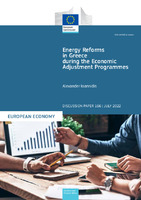Energy Reforms in Greece during the Economic Adjustment Programmes

discussion paper
Συγγραφέας
Ioannidis, Alexander
European Commission
Ημερομηνία
2022-07Προβολή/
Θεματικές επικεφαλίδες
Energy Reforms ; Greece ; Energy ; Climate ; Economic adjustment programme ; Electricity markets ; Natural gas ; Privatisation ; Public Power Corporation ; Country focus ; Financial assistance ; Public Power CorporationΠερίληψη
This paper summarises the approach taken by the Commission during the Economic Adjustment
Programmes to address reforms to Greece’s energy market. It will argue that it was necessary address the
sector as part of the programme, and to make energy-related reforms part of the conditionality applied to
post-programme surveillance, underlined bv the Eurogroup commitments. The paper will explain how the
Greek energy sector looked at the outset of the programme, which problems were seen as priorities to be
tackled, and how such reform efforts developed. With a lack of competition and poorly functioning
markets, necessary investments were not taking place, particularly in the context of the EU’s ambitious
climate and energy goals. The paper will aim to show that over the years, the programmes were effective in
contributing to real structural improvements in the energy markets. Today, the Greek energy sector is
greener and more open to competition. Such reforms, with a focus on developing the renewable energy
sector, proved to be aligned with the general direction of EU policy, shown by events after the programme
such as the European Green Deal and the COVID recovery package, the Recovery and Resilience Facility,
which put an emphasis on sustainable investments.
The state of the energy sector has an impact on a country’s growth and competitiveness, both in its own
right and for sectors that heavily rely on energy inputs. From a social aspect, energy poverty is an important
issue to consider. Before entering the macroeconomic adjustment programmes, the Greek energy market
was much less developed than that of its EU peers, not as open to competition and lacking investment.
Given the importance of energy markets to the wider economy, it was found that a reform programme
should also place focus on this area. With this in mind, this paper will argue that the programme was right
to put efforts into a systematic reform of the Greek energy market. It will argue that those reforms,
sometimes implemented in a different manner to how they were originally envisaged, made good progress,
which helped the energy market from both an economic and environmental/climate perspective, with
benefits for wider society.
Αριθμός σελίδων
30p.Γλώσσα
ΑγγλικάΣημείωση
JEL Classification: L33, Q40Acknowledgements: The author would like to thank Carlo Viviani (SG-RECOVER) and Markela Stamati (DG ENER) for the useful comments and information and the Country Unit for Greece of DG ECFIN and especially the members who contributed for this publication: Platon Derdemezis, Fotini Dionyssopoulou, Sotirios Giannoulis, Julia Lendvai and Vasilis Nikitas.
Contact: Alexander Ioannidis, European Commission, Directorate-General for Economic and Financial Affairs, alexander.ioannidis@ec.europa.eu
doi:10.2765/961088
KC-BD-22-003-EN-N
